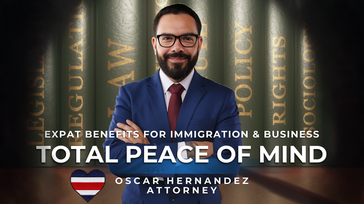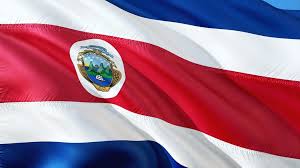The Legal Side of Costa Rica
Featuring Articles Written by Oscar Hernandez, Attorney
Oscar Hernandez is an Immigration Attorney
Located in San Jose, Costa Rica. He & His Team at
Expat Legal Advisors understand the needs
of the Expat who has begun a NEW LIFE in Costa Rica.
They know that the best way to enjoy the Pura Vida Lifestyle is to
have complete knowledge of the Laws of the Land. .
Understanding the Law & Living the Dream. .
Living the Pura Vida lifestyle in Costa Rica means more than enjoying its beaches, jungles and peaceful rhythm.
It means embracing a new way of life built on respect, knowledge and connection.
At Expat Legal Advisors, we believe that the more you understand the laws of the land,
the more fully and confidently you can enjoy the beauty of your new home.
These insightful articles, written by Attorney Oscar Hernández, who practices law in San José,
are designed to guide you through the legal landscape of Costa Rica with clarity and purpose.
From legal residency & real estate to healthcare & daily living, Oscar’s experience and dedication help demystify complex legal topics, empowering expats to make informed decisions
and live freely within the framework of Costa Rican law.
Knowledge is Peace of Mind. . and Peace of Mind is Pura Vida. .
Here, you’ll find practical wisdom, trusted guidance and the tools to help you thrive
as a well-informed member of Costa Rica’s expat community.
Enjoy this Article
Written Especially
for You. .
Opening Up a Bank Account in Costa Rica. .
Having a local bank account in Costa Rica is incredibly useful for expats, as it allows you to pay bills in colones, receive local payments, and avoid hefty foreign transaction fees. However, opening a bank account as a foreigner can be somewhat bureaucratic. This guide explains the legal requirements, documentation, differences between local banks, and insider tips to help you open an account smoothly, whether you are a resident or not. It also sheds light on why banks request extensive information, due to Costa Rica’s strict anti–money laundering regulations.
Foreigners can open bank accounts in Costa Rica, though the ease of doing so depends on residency status and each bank’s policies. Most banks require legal residency to open an account. If you are in Costa Rica on a tourist visa, many private banks will either decline your application or offer only limited services. Banco Nacional de Costa Rica (BNCR), however, allows non-residents to open simplified accounts using just a valid passport and local phone number. These accounts are designed for newcomers or tourists, with transaction limits and balance caps. They are not suitable for high-value or business transactions. If you plan to stay long-term or manage larger sums, obtaining legal residency is advisable, as it enables you to open a full-service account with broader features and fewer restrictions. While non-resident accounts are possible, especially through state banks, full-service accounts with international transfer privileges and higher limits typically require proof of residency.
Costa Rican banks must verify customer identities and the legitimacy of their funds under “Know Your Customer” (KYC) regulations. Required documents usually include a valid passport or DIMEX card (for residents), proof of address such as a utility bill or lease, and proof of income or funds. Non-residents often need a bank reference letter or recent statements from their home bank. A small initial deposit—typically around $25 or ₡10,000—is required, along with completed application and KYC forms detailing employment, source of funds, and expected transactions. Business accounts require additional company documents, including legal formation records, proof of income sources, and representative identification. It’s wise to bring both originals and copies of all documents, and to have translations prepared if anything is not in Spanish.
Costa Rica’s banking system includes both state-owned and private institutions. State banks such as Banco Nacional (BNCR) and Banco de Costa Rica (BCR) guarantee deposits through government backing and have the widest network across the country, though they are known for slower service. Private banks, including BAC San José, Scotiabank, Banco Promérica, and Banco Lafise, tend to offer faster service, more English-speaking staff, and better digital platforms. Private banks now participate in a deposit insurance fund covering up to roughly $12,000, but state banks remain the safest in terms of full government backing. Both state and private banks offer savings and checking accounts in colones and U.S. dollars. For expats receiving funds from abroad, maintaining a dollar account can save conversion fees.
To make the process smoother, it helps to choose a branch familiar with expats—such as those in Escazú, Liberia, or Tamarindo—and visit midweek in the morning when it’s less crowded. Patience and politeness go a long way, as banking in Costa Rica often involves waiting and multiple steps. Always ask about maintenance or ATM fees, and be sure to activate online banking for easier bill payments and transfers through the SINPE system. Opening both colones and dollar accounts is ideal for managing international and local transactions. Debit cards are standard, while credit cards may require residency or an established history. Keep your account active, as inactivity for over a year or two may result in closure, and remember to update your KYC information annually when requested.
Setting up a bank account in Costa Rica can feel like a maze at first, but with the right preparation and guidance, it’s entirely manageable. Expat Legal Advisors and Expat Senior CR assist clients through every step of the process—from gathering documentation to completing applications—so you can focus on enjoying the Pura Vida lifestyle and avoid unnecessary international banking hassles.
Lic. Oscar Andrés López Hernández
Attorney-at-Law
Expat Legal Advisors
When You're in Need of Legal Advice in Costa Rica,
contact
Oscar Hernandez at
WhatsApp:
506-8543-7650
Email:
legal@expatlegaladvisors.com
Website:
Click on the Image Above
to Visit Our Website
Read More Legal Articles Here





